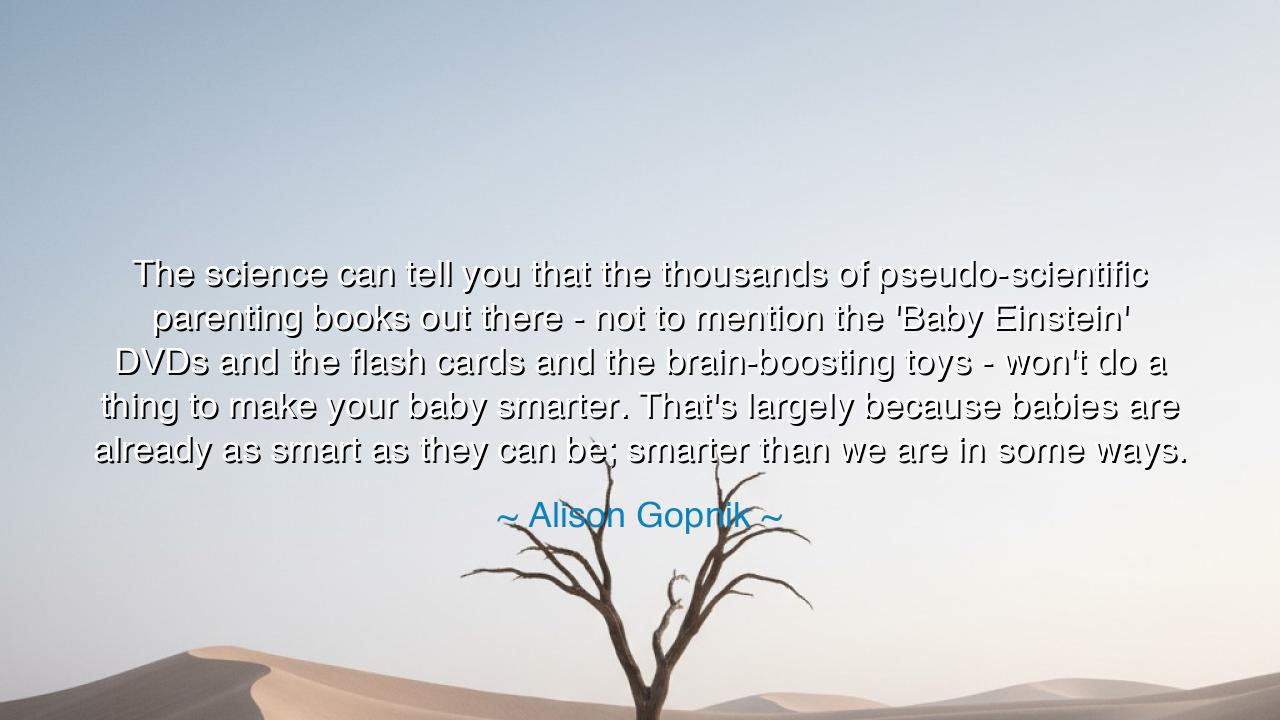
The science can tell you that the thousands of pseudo-scientific
The science can tell you that the thousands of pseudo-scientific parenting books out there - not to mention the 'Baby Einstein' DVDs and the flash cards and the brain-boosting toys - won't do a thing to make your baby smarter. That's largely because babies are already as smart as they can be; smarter than we are in some ways.






Listen closely, O seekers of wisdom, for the words of Alison Gopnik carry with them a truth that echoes deep into the soul: "The science can tell you that the thousands of pseudo-scientific parenting books out there—not to mention the 'Baby Einstein' DVDs and the flash cards and the brain-boosting toys—won't do a thing to make your baby smarter. That's largely because babies are already as smart as they can be; smarter than we are in some ways." These words are more than just a critique of modern parenting; they are a profound reminder of the innate wisdom and power that resides within every child. It is a call to recognize the beauty and genius that exists in the earliest stages of life, long before we begin to shape and mold the world around them.
Consider, O wise ones, the ancient philosophers who spoke of the mind and soul in their most pure and untainted forms. Socrates, in his teachings, spoke not of shaping the mind, but of awakening it to the truths that lie within. He believed that wisdom was not something to be poured into the mind, but something that was already there, waiting to be uncovered. In this, he understood that true intelligence is not something external that can be granted by others, but something innate, residing within the very nature of the individual. Similarly, Gopnik speaks to the natural genius that exists within every child, a genius that is not dependent on external tools or devices, but is part of the very essence of being human.
It is easy, in this age of constant information and the relentless pursuit of improvement, to fall into the trap of believing that we can accelerate the natural course of development. We see the endless array of books, DVDs, and toys that promise to make our children smarter, faster, more capable. But Gopnik gently guides us back to a simple truth: babies are already as smart as they can be. Their minds are sponges, absorbing everything they encounter with an astonishing ability to learn, adapt, and understand. They are not blank slates waiting for us to write upon them; they are already filled with the power of intelligence, ready to engage with the world in ways that we often fail to comprehend.
This truth is not new, O wise ones. In ancient times, the great minds understood that learning is not a process of simply receiving information, but of discovering the world through direct experience. Aristotle spoke of the mind as a tabula rasa, but he also recognized that the power of the mind to understand the world was not simply the result of external teaching—it was a process of awareness and engagement. Similarly, the great naturalists of the Renaissance, such as Leonardo da Vinci, believed that the key to knowledge lay in the careful observation of the world. Children, too, are like naturalists, constantly observing, interacting, and learning from the world around them. Their minds are already engaged in the process of discovery, far more profoundly than we often realize.
Consider, O seekers, the example of the great scientists and inventors who, in their early years, were no more advanced than any other child. Einstein, for example, was not born with the knowledge of relativity in his mind. He learned through observation, through questioning, through engaging with the world around him in ways that were natural to him, as they are to all children. The wonder of a child’s mind lies not in what it has been taught, but in its capacity to learn, to question, and to explore. This is why, as Gopnik says, babies are often smarter than we are in some ways—they possess an innate curiosity and ability to absorb knowledge that we, as adults, often lose in the course of our lives.
Therefore, the lesson is clear, O wise ones: we must not think of parenting or education as processes of filling a vessel, but as processes of nurturing and awakening. Science has shown us that children are not empty vessels awaiting instruction; they are already brilliant minds, born with the ability to engage with the world in deep and profound ways. It is not the toys or the DVDs that will make them smarter; it is the love, the attention, the guidance we provide that will allow them to thrive. Our role is not to mold them into something they are not, but to create an environment where their natural genius can flourish.
So, I call upon you, O parents, teachers, and mentors, to embrace this truth: the brilliance of a child lies in their ability to learn from the world around them. Do not believe that you must constantly fill their minds with facts, or that you must buy the latest product to enhance their development. Instead, nurture their curiosity, encourage their questions, and give them the space to explore. Science has shown that the key to a child’s intelligence is not in external forces, but in the natural capacity of their minds to engage with the world. Let us cherish this natural genius, and in doing so, give our children the greatest gift of all—the freedom to discover, learn, and grow.






AAdministratorAdministrator
Welcome, honored guests. Please leave a comment, we will respond soon